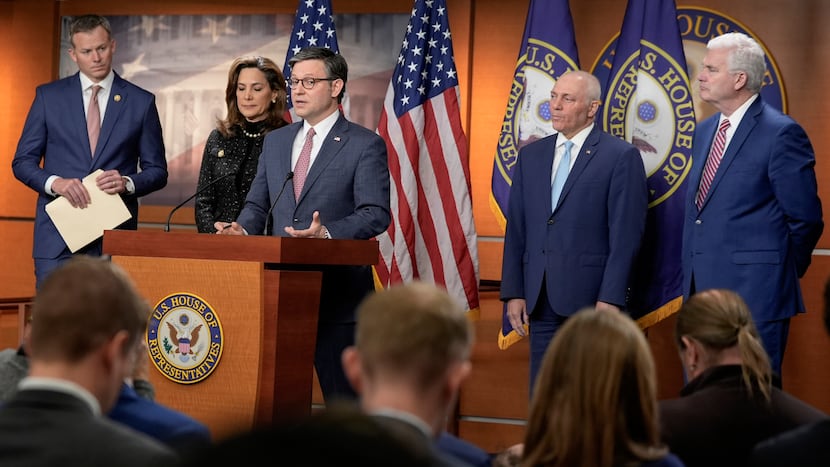Lawmaker Urges Collaboration for Legislative Progress
In a recent news article, U.S. Rep. Marjorie Taylor Greene cautioned Speaker Mike Johnson against seeking bipartisan support for upcoming legislation. Despite the urgent need to pass crucial bills that would greatly benefit the nation, Greene’s approach seems to prioritize confrontation over cooperation. It is essential to recognize that true democracy thrives when different factions come together to find common ground and move the country forward.
Rather than resorting to divisive tactics, it is imperative to engage in meaningful discussions and negotiations to advance the collective good. Greene’s confrontational stance, characterized by threats and warnings, not only appears counterproductive but also runs contrary to the spirit of democratic governance. Embracing a collaborative approach is fundamental to demonstrating our unwavering commitment to upholding the constitution and serving the interests of the American people.
There is a myriad of pressing tasks at hand, such as confirming ambassadors, enacting border-related legislation, and providing assistance to Ukraine in the face of escalating tensions with Russia. The workload is substantial, and it is essential to set aside differences and work towards common goals for the betterment of the nation.
Martha Ryan, Plano
Reflecting the Majority’s Voice: A Call for Genuine Representation
The notion of aligning policies with the “will of the people” extends beyond the realm of abortion, as highlighted by Donald Trump. Various surveys conducted by reputable organizations reveal significant public support for a range of issues, including stricter gun regulations, pathways to citizenship for immigrant children, bipartisan border measures, aid to Ukraine, and active participation in global climate initiatives.
Despite these clear preferences expressed by the majority of Americans, the voices of the minority often overshadow them, leading to a disconnect between public opinion and legislative action. It is crucial to recenter the focus on truly representing the collective interests and values of the populace, transcending partisan divides and special interests.
In a democratic society, the genuine “will of the people” should serve as the guiding principle for policymakers, ensuring that decisions align with the broader consensus rather than catering solely to select groups. By prioritizing the voices of the majority and fostering a more inclusive and responsive governance framework, we can uphold the democratic ideals that form the foundation of our nation.
Chris Kroeger, Keller
The GOP’s Contradictory Stance on Family Values
While the GOP champions itself as the party of “pro-life” principles, recent policy directions raise concerns about its commitment to supporting families. From advocating for abortion bans to promoting charter schools over public education and even considering restrictions on in vitro fertilization, the party’s actions appear to hinder, rather than facilitate, family planning and support.
For individuals like Will Dominguez and his wife, these policy shifts have practical implications that could limit their reproductive choices and access to essential healthcare services. The disconnect between the GOP’s rhetoric on family values and its policy agenda raises questions about the party’s true priorities and the impact of its decisions on ordinary Americans.
It is essential for political parties to align their actions with their professed values, especially concerning matters as personal and significant as family planning. By fostering policies that genuinely support families and individuals in their reproductive choices, lawmakers can uphold the principles of compassion and inclusivity that are integral to a thriving society.
Will Dominguez, Richardson
Reevaluating the Fan Experience at Sporting Events
Attending a baseball game should be a joyful experience, filled with camaraderie and excitement. However, the recent trend of excessively loud speakers at sports venues, as lamented by Beth Thompson, has detracted from the enjoyment of the game for many spectators, particularly children.
The overwhelming volume levels not only disrupt the natural ambiance of the game but also pose potential health risks, especially for young attendees. Creating a more pleasant and inclusive environment at sporting events should be a priority for organizers, ensuring that fans of all ages can fully engage with the game without discomfort or distress.
As we strive to enhance the overall fan experience, it is crucial to consider the impact of sound levels on audience enjoyment and well-being. By striking a balance between creating an energetic atmosphere and maintaining a comfortable setting, sports venues can cater to a diverse range of spectators and foster a more positive and memorable experience for all.
Beth Thompson, Dallas/Old Lake Highlands
Reviving Civil Discourse Through Language
In a thought-provoking commentary on the power of language, Rudolph Bush underscores the importance of using words to facilitate constructive dialogue and understanding. Language serves as a tool for expressing ideas and engaging in meaningful discussions, transcending mere ideological slogans and fostering genuine communication.
The essence of civil discourse lies in the ability to articulate diverse viewpoints respectfully and engage in dialogue that promotes mutual comprehension and empathy. By reclaiming language as a vehicle for nuanced expression and thoughtful debate, we can bridge divides, cultivate empathy, and foster a culture of constructive engagement.
Richard Bach, Garland
Navigating Political Engagement with Faith and Conviction
Peggy Wehmeyer’s reflection on the intersection of faith and politics resonates deeply with many Christians grappling with their role in the public sphere. While drawing parallels between Jesus’ spiritual mission and contemporary political involvement, it is essential to navigate this complex terrain with wisdom and discernment.
The democratic framework calls for active citizen participation in governance, necessitating a delicate balance between earthly responsibilities and spiritual convictions. Engaging in political advocacy stems from deeply held beliefs and a commitment to upholding moral principles in societal structures.
As Christians navigate the realm of politics, it is crucial to approach advocacy with grace, love, and a steadfast commitment to values rooted in the teachings of the Bible. By actively participating in shaping governance and advocating for policies that reflect compassion, justice, and integrity, believers can embody their faith in tangible ways within the public sphere.
David Rea, Dallas
Senior Pastor, Providence Presbyterian Church
